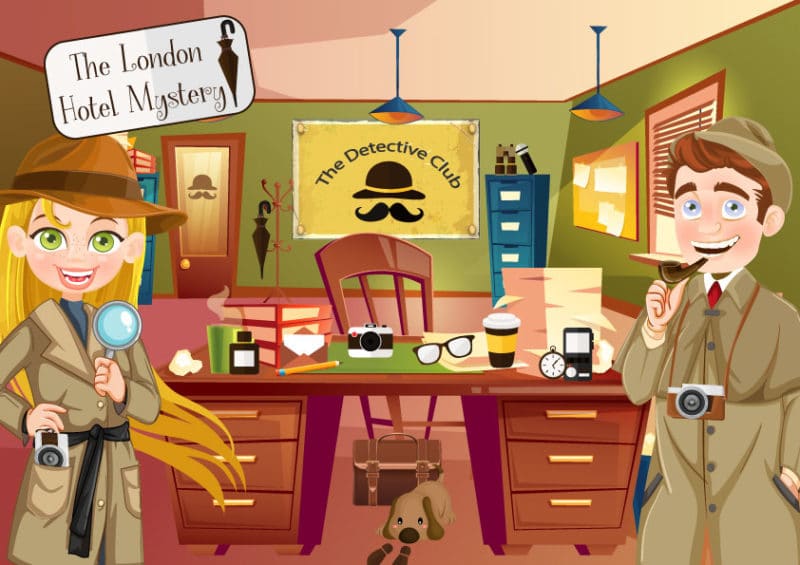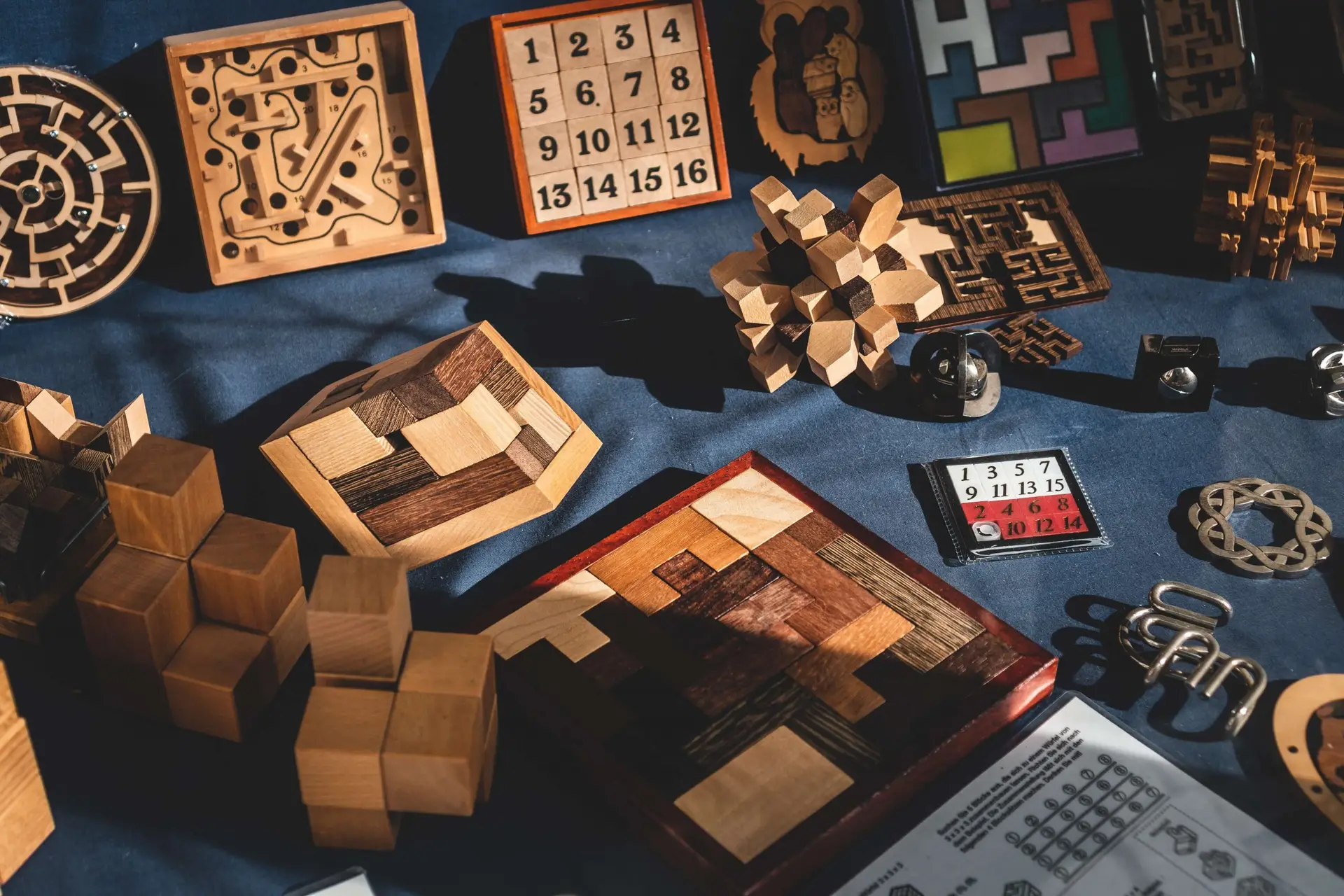Mystery games give kids more than just fun—they provide significant developmental benefits and keep children excited to participate. These interactive challenges take about 1.5 hours to complete and blend entertainment with learning. Kids solve different puzzles that are the foundations of math, spatial reasoning, deduction, and language pattern recognition. This helps build their cognitive skills naturally.
Detective puzzle games and free printable detective games are available tools that parents and educators love to use. These smart activities challenge young minds at just the right level. Quality mystery solving games for kids usually have a series of puzzles that lead to rewarding solutions. Family mystery game nights, classroom activities, and detective party games change regular playtime into learning adventures that kids enjoy.

Table of Contents
- 1 Why mystery games are more than just fun
- 2 How mystery games build problem-solving skills
- 3 Types of mystery games that help kids think critically
- 4 The role of storytelling in mystery games
- 5 Making mystery games a family or classroom activity
- 6 Here are some FAQs about mystery games for kids:
- 6.1 How to create a mystery game for kids?
- 6.2 How to play a detective game with kids?
- 6.3 How to make a spy game for kids?
- 6.4 What are some good mystery ideas?
- 6.5 What is the one minute game for children’s day?
- 6.6 What’s the best mystery game?
- 6.7 Is 5 minute mystery free?
- 6.8 How to play scavenger hunt game for kids?
Why mystery games are more than just fun
Mystery games for kids do more than just entertain – they’re powerful educational tools that develop significant life skills. Parents and teachers now see these games as valuable resources for cognitive development, not just simple pastimes.
They spark curiosity and imagination
These games’ educational value comes from knowing how to activate brain functions needed for growth. Kids who play mysteries develop neural connections in the prefrontal cortex that affect emotional regulation and problem-solving skills. These games also release pleasure hormones like oxytocin and dopamine. These hormones regulate emotions and help with memory, motivation, attention, and mood.
Family mystery games turn regular evenings into exciting trips of discovery. Kids’ sense of wonder grows as they search for hidden treasures or crack curious cases. This spark of curiosity builds the foundation for genuine learning. As one educational expert notes, “Curiosity is where real learning begins. Kids learn best when they lead — asking questions, trying things out, even making mistakes”.
These interactive experiences let kids play imaginatively—a key part of child development that promotes creativity and exploration. Kids who take on detective roles learn to:
- Solve problems creatively
- Understand others through role-playing different viewpoints
- Tell better stories
- Think more abstractly
They encourage kids to ask questions
Mystery solving games help kids develop questioning skills—one of their biggest benefits. Games like “Guess Who” and “Who Am I” teach children how to develop good questions. Kids learn to ask specific yes/no questions that help them eliminate possibilities. This skill helps both in school and real-life problem-solving.
Kids who play mystery games boost their language skills as they practice asking questions. Many language learners find it harder to ask questions than answer them. Detective games give kids a fun way to practice without feeling like they’re studying.
Murder mystery games for kids also build social smarts. Kids learn to listen to others’ viewpoints and build on shared knowledge as they solve mysteries together. They discover that asking good questions often matters more than having quick answers.
They introduce basic logic and reasoning
Detective mystery games excel at building logical thinking in young minds. These games challenge kids to spot patterns, follow sequences, and balance thinking with logical reasoning. Kids must look closely at details and make logical conclusions when solving mysteries.
Critical thinking—knowing how to think logically, rationally, and creatively—is the main benefit of these activities. Through classroom detective games and free printable detective games, children learn to:
- Express problems clearly
- Spot hidden assumptions
- Look at concepts critically
- Study possible causes
- Find solutions through logical reasoning
Online mystery games help kids specifically with deductive reasoning. Kids develop what educators call “syllogistic reasoning” as they work through complex puzzles. They use “if-then” statements to rule out possibilities and reach logical conclusions. This thinking helps with subjects like math and science, plus everyday decisions.
Mystery board games for kids are nowhere near just entertainment—they build thinking skills that last a lifetime.
How mystery games build problem-solving skills
Problem-solving skills are the life-blood of success in education and life, and mystery games for kids foster these skills in unique ways. Studies show puzzle play substantially boosts a child’s problem-solving ability, spatial reasoning, and memory. The benefits go way beyond the reach and influence of simple puzzle solving.
Following clues step-by-step
Kids learn to tackle problems methodically through mystery solving games. Players must analyze information with a critical eye – they look at details, weigh facts, and avoid rushing to conclusions. This well-laid-out approach directly applies to ground problem solving.
Detective mystery games teach children to:
- Follow sequential clues that build upon each other
- Practice focused attention on relevant details
- Develop patience and perseverance through multi-step challenges
- Apply logical thinking to reach solutions
Children who participate in mystery activities like treasure hunts practice following connected clues. Each clue guides them to the next, and they learn to tackle problems in logical sequence rather than randomly. This methodical approach helps them develop vital executive function skills that research links to school readiness.
Making connections between different pieces of information
Mystery games excel at teaching children to blend information from various sources. Murder mystery games let participants take on different character roles, each with unique backgrounds and secrets. They work together to unravel clues, solve puzzles, and end up finding the fictional culprit.
These games challenge children to spot patterns and link seemingly unrelated information. Players learn to:
- Identify connections between separate clues
- Distinguish relevant from irrelevant information
- Organize information into meaningful patterns
- Apply deductive reasoning to reach conclusions
Pattern recognition becomes especially valuable in classroom detective games where students connect different pieces of evidence. The same skills apply whether they solve family mystery games at home or tackle detective party games with friends.
Learning from trial and error
Mystery games teach children the value of trial and error. Kids solve puzzles through experimentation at first, and they remember what works and what doesn’t. This builds both memory and resilience.
Online mystery games create safe spaces where failure becomes a learning tool rather than a setback. Kids learn to note failed attempts and quickly try new ideas when they hit roadblocks. They build resilience through their mistakes.
Mystery games show children that some problems need patience and persistence. Completing mystery challenges gives them a sense of accomplishment. They learn to handle frustration better while gaining confidence.
Detective mystery games build skills that go beyond just playing. These abilities transfer to academic challenges, especially math and science, where pattern recognition and logical reasoning matter most. Parents and educators looking to boost children’s critical thinking will find mystery board games are a great way to get these life skills.

Types of mystery games that help kids think critically
Mystery games for kids are powerful tools that combine fun with learning. Parents and teachers can choose from several game types that help develop critical thinking skills while keeping children entertained.
Detective board games
Detective board games create perfect environments to build deduction skills. “Clue” remains a family favorite that lets older kids develop their reasoning abilities through game markers, weapons, and challenge cards in a fun, competitive setting. Young detectives will love “Cat Crimes” with its fun theme and puzzles that help build logical thinking skills.
These mystery board games typically come with:
- Difficulty levels that adapt to children’s growing abilities
- Visual elements that suit different learning styles
- Clear rules that teach fair play and patience
“The award-winning mystery game ‘Cat Crimes’ is particularly effective for developing logical thinking and deductive reasoning skills with increasingly tougher puzzles,” notes one educational resource.
Printable scavenger hunts
Scavenger hunts turn regular spaces into exciting adventure zones. These adaptable activities work great at home or in classrooms and can be tailored to suit any age group.
Scavenger hunts do more than just entertain. Kids improve their observation skills, develop physical abilities, and get sensory stimulation. They also practice fine motor control when they mark or color found items. Parents can make these activities last longer by laminating the printables or using dry erase pockets.
Online mystery games for kids
Digital detective games let kids solve mysteries through interactive stories that build logic and critical thinking. Players face object searches, creative puzzles, and memory challenges that sharpen their focus and eye for detail. Many platforms now feature mystery games without ads or harmful content, making them safe choices for young investigators.
Escape room-style puzzles
Escape room mysteries have become popular ways to challenge kids’ problem-solving abilities. Children use math, map reading, and deductive reasoning to catch culprits and eliminate suspects.
Making escape rooms at home starts with picking themes, crafting stories, and hiding clues in clever spots like books, cushions, or baskets. Kids learn persistence through these activities – when stuck, they review clues and try new approaches instead of giving up.
Classroom detective games PDF
Mystery activities work great in classrooms when they match learning goals. Teachers can find free printable mystery games that challenge students to use logic and clues. “The Pilfered Quill” escape room helps kids improve their reading and problem-solving abilities as they work together to crack codes, solve puzzles, and complete mazes.
These mystery-solving activities give kids chances to think critically while having fun. The best games blend entertainment with education so well that children don’t realize how much they’re learning as they play.
The role of storytelling in mystery games
Storytelling is the foundation of effective mystery games for kids. These games create immersive experiences that turn simple puzzles into memorable adventures. Standard educational activities pale in comparison to narrative-driven games that fascinate young minds through emotional connections and personal investment in outcomes.
How narratives keep kids engaged
Mystery games for kids turn passive learning into active participation through interactive narratives. Children become heroes in their own adventures and develop a sense of ownership and agency. Kids build personal connections with the material, which enhances their enjoyment and understanding.
The best family mystery games release clues and narrative elements gradually. This approach keeps student interest high over long periods and creates lasting engagement instead of brief excitement. Studies show that educational games with storytelling elements help promote and maintain motivation.
Key engagement factors include:
- Evolving displays that change as mysteries unfold
- Multimodal storytelling incorporating various media forms
- Narratives that appeal to different learning styles
- Characters that children can identify with or aspire to be
Using characters and plots to teach deduction
Character development lies at the heart of compelling mystery solving games for kids. Characters add color, intrigue, and excitement to adventures while teaching significant reasoning skills. Children develop empathy and problem-solving abilities by stepping into different roles and views.
Great mysteries start with stories that appeal to children’s interests and imagination. Themes like pirate adventures and space exploration provide perfect settings to practice deductive reasoning. Plots with puzzles and clues make learning feel like discovery rather than work.
Building reading comprehension through mystery stories
Detective mystery games for kids boost reading comprehension naturally as children read closely and make inferences. This process helps them analyze details, evaluate motives, and connect seemingly unrelated information—all vital literacy skills.
Murder mystery games for kids combine textual clues, visual displays, digital content, and physical artifacts. This rich mix appeals to various learning styles and strengthens comprehension across formats.
Mystery stories teach children to track narratives step by step. Kids learn to follow evidence trails, spot patterns, and understand story structure. The best mystery stories encourage children to ask “why”—they learn to examine texts carefully instead of reading passively.
Making mystery games a family or classroom activity
Mystery games for kids work great as social activities that blend education and fun in many different settings. These interactive games blend naturally into family time, birthday parties, or classroom activities.
Family mystery game night ideas
Regular family mystery nights give everyone a chance to solve problems together. These games typically run between 90 minutes to a full evening, which makes them perfect for weekend family get-togethers. Most mystery kits can handle groups of 8-100+ players, so the whole extended family can join in. Parents should take 1-2 weeks to get everything ready. This preparation ensures everyone has a great time when game night arrives.
Detective party games for birthdays
Detective themes can make birthday parties extra special. Many DIY detective party games are budget-friendly, and treasure hunts with locked trunks full of prizes add excitement. Digital mystery party packages are available for immediate download, which eliminates waiting for shipping. Kid-friendly themes replace murder mysteries with fun scenarios like “who shaved the poodle’s hair”. This keeps the content age-appropriate and entertaining.
Tips for teachers using mystery games in class
Mystery games are powerful tools in academic environments. Students become active investigators when they solve whodunits. They sort evidence and piece together timelines. Teachers can step back and watch, only stepping in to guide when needed. Class discussions help students see how they used historical thinking skills like contextualizing, synthesizing, and investigating. Student engagement shows through assessment worksheets that track character details, motives, and alibis.
Mystery games are powerful tools that boost cognitive development while keeping children entertained. These fun activities turn regular playtime into chances to learn vital life skills. Kids who play detective games learn to think critically, follow logical patterns and push through challenges.
Families who make mystery-solving part of their routine see their kids develop amazing abilities. These games teach patience, analytical thinking, and step-by-step problem-solving approaches. Mystery games prepare young minds for school success and build their confidence through achievement.
Teachers find classroom detective games to be valuable teaching tools. Students are happy to learn when lessons become mysteries to crack instead of facts to remember. This active participation helps them grasp and retain information better.
Mystery games come in many formats to suit every family’s needs and learning preferences. Board games, printable puzzles, digital quests, and escape rooms let children experience the excitement of cracking cases while building their thinking skills. Parents and teachers can tailor these activities to match children’s interests, which makes learning feel natural.
These games ended up giving kids safe spaces to try, fail, and try again – a key process in building resilience. Today’s young detectives will become tomorrow’s problem solvers with the confidence and analytical skills to tackle real-life challenges. Parents and teachers who embrace these games help prepare kids for both academic excellence and success beyond school.
Here are some FAQs about mystery games for kids:
How to create a mystery game for kids?
To create a mystery game for kids, start with a simple, age-appropriate storyline like a missing object or a harmless puzzle. Include colorful clues, friendly characters, and a satisfying solution to make engaging mystery games for kids that are fun but not frightening.
How to play a detective game with kids?
You can play a detective game with kids by giving them a magnifying glass and notepad to search for hidden clues around your home or yard. These mystery solving games for kids work well when you create a simple case for them to solve with clear steps and rewards.
How to make a spy game for kids?
To make a spy game for kids, create secret codes, invisible ink messages, and simple disguise elements for them to use on missions. These mystery party games for kids can be themed around retrieving a “stolen” recipe or decoding an important message for a fun, interactive experience.
What are some good mystery ideas?
Good mystery ideas for children include finding a missing pet, discovering who took the last cookie, or solving a treasure map puzzle. These concepts work perfectly for mystery games for kids because they’re engaging but not scary, allowing children to use their reasoning skills.
What is the one minute game for children’s day?
The one minute game for Children’s Day typically involves quick challenges like stacking cups, solving a simple puzzle, or completing a physical task within 60 seconds. While not specifically mystery games for kids, these quick activities can be incorporated into larger mystery party games for kids as timed challenges.
What’s the best mystery game?
The best mystery game depends on age, but for young children, games like “Outfoxed” or “Enchanted Forest” are excellent choices. These board games provide structured mystery solving games for kids with clear rules and cooperative elements that make solving puzzles rewarding.
Is 5 minute mystery free?
Yes, 5 Minute Mystery offers free cases on their website and app that are perfect as quick mystery games for kids online. These short, engaging mysteries are designed to be solved quickly, making them ideal for children with limited attention spans.
How to play scavenger hunt game for kids?
To play a scavenger hunt for kids, create a list of items to find or clues to solve that lead to the next location. This activity works wonderfully as mystery party games for kids when you incorporate a storyline, like finding pieces of a map or solving a simple mystery through the collected items.

